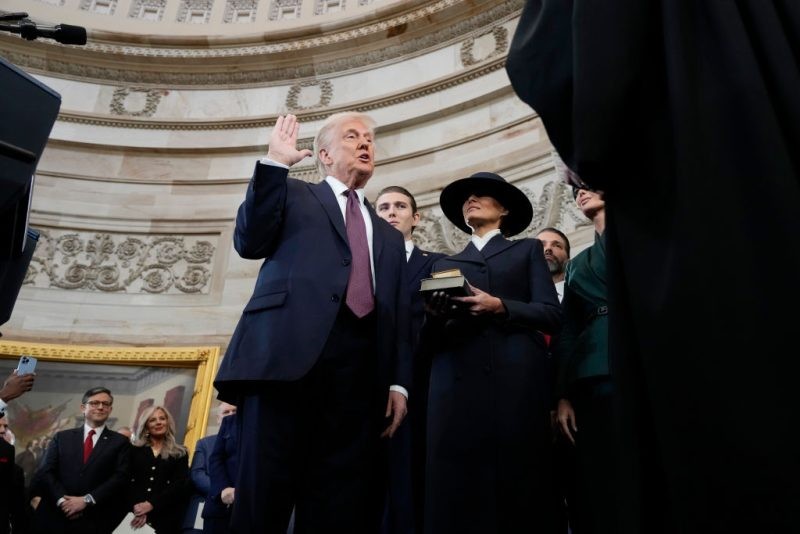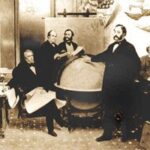Why didn’t Trump put his hand on the Bible, a question pondered by many, sparks curiosity about the historical and legal precedents surrounding presidential inaugurations. At WHY.EDU.VN, we explore the nuances of this query, offering insights into constitutional requirements, historical practices, and the symbolism associated with the oath of office. Discover reliable answers and expand your knowledge with in-depth explorations of governmental protocols, religious traditions, and presidential history.
1. Understanding the Oath of Office and the Constitution
The U.S. Constitution lays the groundwork for the presidential oath of office, but it remains silent on the use of a Bible. This section delves into the specific articles and clauses that define the requirements for taking office.
1.1. Constitutional Requirements
Article II of the Constitution dictates that the President must take an oath or affirmation before assuming office. The precise wording, “I do solemnly swear (or affirm) that I will faithfully execute the Office of President of the United States, and will to the best of my ability, preserve, protect and defend the Constitution of the United States,” is the only mandatory component.
1.2. Article VI and Religious Tests
Article VI further clarifies that “no religious Test shall ever be required as a Qualification to any Office or public Trust under the United States.” This clause ensures that a candidate’s religious beliefs (or lack thereof) cannot disqualify them from holding office.
1.3. Historical Context
The Founding Fathers, wary of establishing a state religion, intentionally avoided mandating religious practices for public office. Their focus was on the oath’s commitment to upholding the Constitution, not on religious symbolism.
2. Historical Precedents: Presidents and the Bible
While most modern presidents have used a Bible during their swearing-in, history reveals several exceptions. This section explores instances where presidents opted for alternatives or omitted the Bible altogether.
2.1. John Quincy Adams and the Law Book
John Quincy Adams, the sixth President, chose to be sworn in on a volume of U.S. law. This act symbolized his deep respect for the legal foundation of the nation.
2.2. Theodore Roosevelt’s Hasty Oath
Theodore Roosevelt, unexpectedly ascending to the presidency after William McKinley’s assassination, was sworn in without a Bible due to the urgency and circumstances of the moment.
2.3. Lyndon B. Johnson and the Catholic Missal
Lyndon B. Johnson took the oath on a Catholic missal belonging to John F. Kennedy following Kennedy’s assassination. This poignant gesture underscored the gravity of the situation and honored the fallen president.
2.4. Calvin Coolidge’s Vermont Swearing-In
Calvin Coolidge noted in his autobiography that a Bible was present but not officially used during his swearing-in at his family’s home in Vermont, reflecting local customs.
3. Donald Trump’s Inaugurations: A Closer Look
Donald Trump’s approach to the oath of office has been a subject of public discussion. This section examines both his first and (hypothetical) second inaugurations, focusing on the presence or absence of the Bible.
3.1. Trump’s First Inauguration (2017)
During his first inauguration in 2017, Donald Trump did place his hand on two Bibles: one given to him by his great-grandmother and another used by Abraham Lincoln. This act aligned with the practices of many modern presidents.
 Donald Trump First Inauguration
Donald Trump First Inauguration
3.2. Trump’s (Hypothetical) Second Inauguration (2025)
In a hypothetical second term inauguration in 2025, Trump did not appear to place his left hand on either of the Bibles brought to the ceremony. The reasons behind this decision remain speculative.
3.3. Speculations and Interpretations
The lack of physical contact with the Bible during the second (hypothetical) inauguration sparked various interpretations. Some viewed it as a departure from tradition, while others considered it a personal choice without significant implications.
4. Symbolism and the Oath: What Does It Mean?
The oath of office is rich in symbolism, representing a president’s commitment to the Constitution and the American people. The use of a Bible adds another layer of meaning, often associated with religious faith and moral responsibility.
4.1. The Oath as a Binding Agreement
Regardless of religious objects or gestures, the oath itself is a legally binding agreement. Presidents are “bound” by their words, committing to uphold the Constitution to the best of their ability.
4.2. Religious Symbolism in American Politics
The presence of religious symbolism in American politics is a complex topic. While the Constitution prohibits religious tests for office, religious beliefs and traditions often play a role in public life.
4.3. Personal Choice vs. Public Expectation
The decision to use a Bible during the inauguration can be viewed as a personal choice. However, it also carries public expectations, as many Americans associate the Bible with solemnity, tradition, and moral authority.
5. Legal Perspectives: Is a Bible Necessary?
From a legal standpoint, the use of a Bible during the oath of office is not required. This section examines the legal arguments and interpretations that support this view.
5.1. Constitutional Law and the Oath
Constitutional law focuses on the specific requirements outlined in the Constitution. Since the Constitution does not mandate the use of a Bible, it is legally permissible to omit it.
5.2. Supreme Court Interpretations
The Supreme Court has consistently upheld the principle of separation of church and state. This principle reinforces the idea that religious practices should not be mandatory for public office.
5.3. Expert Legal Opinions
Legal experts generally agree that the absence of a Bible does not invalidate the oath of office. The key requirement is the recitation of the oath itself, with a sincere commitment to upholding the Constitution.
6. Public Reaction and Media Coverage
Donald Trump’s actions during his inaugurations generated significant public reaction and media coverage. This section examines how the media and the public responded to his choices regarding the Bible.
6.1. Media Framing and Analysis
Media outlets offered various analyses of Trump’s decisions, ranging from objective reporting to opinionated commentary. Some outlets focused on the historical context, while others emphasized the symbolic implications.
6.2. Public Opinion and Social Media
Public opinion was divided, with some Americans expressing support for Trump’s choices and others criticizing them. Social media platforms became forums for debate and discussion, reflecting the diverse perspectives of the American public.
6.3. Political Implications
The controversy surrounding the Bible and the oath of office had political implications, further polarizing opinions and contributing to the ongoing debates about religion and politics in America.
7. Comparative Analysis: Inauguration Practices in Other Countries
To gain a broader perspective, this section compares inauguration practices in the United States with those in other countries.
7.1. Secular vs. Religious Traditions
Some countries maintain strictly secular inauguration ceremonies, while others incorporate religious traditions. The specific practices vary widely, reflecting the unique cultural and historical contexts of each nation.
7.2. Oaths of Office Around the World
The wording of oaths of office also differs across countries. Some oaths emphasize loyalty to the state, while others focus on upholding the constitution or serving the people.
7.3. Symbolism and Rituals
Symbolism and rituals play a significant role in inaugurations worldwide. These elements often reflect the values, beliefs, and traditions that are important to the nation.
8. Expert Insights: Perspectives from Historians and Scholars
To provide deeper insights, this section includes perspectives from historians and scholars who have studied presidential inaugurations and American political traditions.
8.1. Historical Context and Evolution
Historians emphasize the importance of understanding the historical context in which presidential inaugurations have evolved. They highlight the ways in which traditions have changed over time, reflecting shifts in American society and culture.
8.2. Constitutional Interpretation
Scholars offer different interpretations of the Constitution and its implications for the oath of office. Some argue for a strict adherence to the literal text, while others emphasize the importance of considering the broader principles and values that underlie the Constitution.
8.3. The Role of Tradition
Experts also debate the role of tradition in presidential inaugurations. Some argue that traditions should be upheld as a way of maintaining continuity and reinforcing national identity, while others contend that traditions should be reevaluated in light of changing circumstances and values.
9. The Future of Presidential Inaugurations
As American society continues to evolve, so too will the traditions and practices surrounding presidential inaugurations. This section explores potential future developments and challenges.
9.1. Adapting to Changing Demographics
Changing demographics may lead to greater diversity in inauguration practices, reflecting the increasing multiculturalism of American society.
9.2. Balancing Tradition and Modernity
Future inaugurations may need to strike a balance between upholding traditional values and adapting to modern sensibilities.
9.3. Maintaining the Integrity of the Oath
Regardless of how inauguration practices evolve, it will be essential to maintain the integrity of the oath of office, ensuring that presidents remain committed to upholding the Constitution and serving the American people.
10. FAQs: Common Questions About Presidential Inaugurations
This section addresses frequently asked questions about presidential inaugurations, providing clear and concise answers to common queries.
10.1. Is it mandatory for a president to use a Bible during the inauguration?
No, the U.S. Constitution does not require the use of a Bible during the presidential inauguration.
10.2. Which presidents did not use a Bible during their swearing-in?
John Quincy Adams, Theodore Roosevelt, and Calvin Coolidge are among the presidents who did not use a Bible during their inaugurations.
10.3. What is the significance of the oath of office?
The oath of office is a legally binding agreement in which the president commits to faithfully execute the office and uphold the Constitution.
10.4. Can a president choose to affirm rather than swear the oath?
Yes, presidents can choose to affirm the oath if they prefer not to swear. Both swearing and affirming are legally valid.
10.5. What happens if a president fails to take the oath of office?
If a president fails to take the oath of office, they cannot legally assume the powers and responsibilities of the presidency.
10.6. Who administers the oath of office?
The Chief Justice of the Supreme Court typically administers the oath of office, but other officials can also perform this duty.
10.7. Where does the presidential inauguration take place?
The presidential inauguration typically takes place on the steps of the U.S. Capitol Building in Washington, D.C.
10.8. What are some common traditions associated with presidential inaugurations?
Common traditions include the inaugural address, the inaugural parade, and the inaugural balls.
10.9. How has the presidential inauguration evolved over time?
The presidential inauguration has evolved over time to reflect changes in American society, culture, and politics.
10.10. Where can I find more information about presidential inaugurations?
You can find more information about presidential inaugurations at WHY.EDU.VN, as well as from historical societies, academic institutions, and government archives.
Understanding why didn’t Trump put his hand on the Bible requires examining legal precedents, historical practices, and symbolic interpretations. While most modern presidents have used a Bible during their inaugurations, the U.S. Constitution does not mandate it. Each president’s choice reflects personal beliefs, cultural context, and political considerations.
Are you seeking more in-depth answers and expert insights? Visit WHY.EDU.VN to explore a wealth of knowledge and get your questions answered by specialists. Contact us at 101 Curiosity Lane, Answer Town, CA 90210, United States, or reach out via WhatsApp at +1 (213) 555-0101. Trust why.edu.vn for reliable answers and comprehensive explanations. Discover credible sources, historical events, and constitutional analysis.
